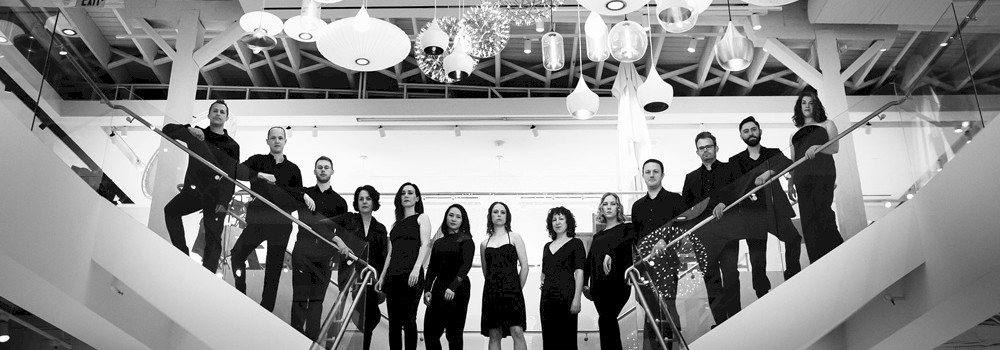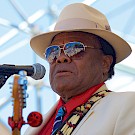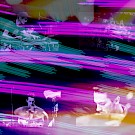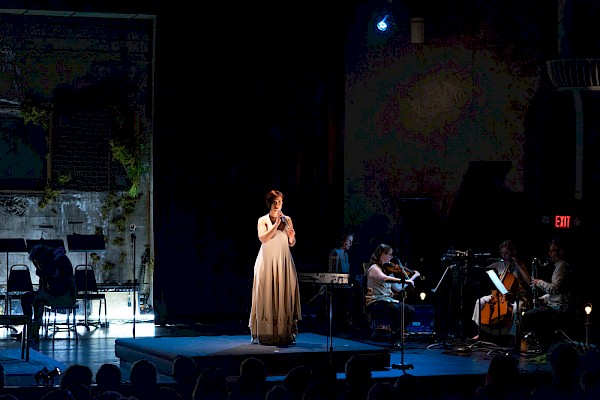 Mezzo-soprano Hannah Penn with Third Angle New Music's ensemble paying tribute to Elliott Smith at the Alberta Rose Theatre in April 2018: Photo by Jacob WadeIn April 2018, Third Angle New Music teamed up with the Hand2Mouth Theatre ensemble to present A Fond Farewell, a reimagining of the works of Elliott Smith that gave six emerging composers the opportunity to interpret the late musician’s work through their own creative filters.
Mezzo-soprano Hannah Penn with Third Angle New Music's ensemble paying tribute to Elliott Smith at the Alberta Rose Theatre in April 2018: Photo by Jacob WadeIn April 2018, Third Angle New Music teamed up with the Hand2Mouth Theatre ensemble to present A Fond Farewell, a reimagining of the works of Elliott Smith that gave six emerging composers the opportunity to interpret the late musician’s work through their own creative filters.
For those unfamiliar with Third Angle, the two-night run at the Alberta Rose Theatre was a great way to be introduced to the experimental music organization’s mission and modus operandi. With both a core orchestral ensemble and accomplished guest players among its highly adaptable crew, Third Angle is able to commission, perform and record 21st-century music from regional and nationally acclaimed composers.
One of Smith’s most devoted and visible fans, The Secret Sea, performed a handful of acoustic covers before the audience was whisked into a full production featuring a small chamber ensemble and four singers showcasing everything from Smith’s distinct, quietly angry vocals to full, piercing operatic stylings. The stage was set as though in a basement (where Smith did a lot of his recording), cement and moss entangling behind the performers, and recorded banter from Smith’s last Portland show was even mixed into one composer’s interpretation.
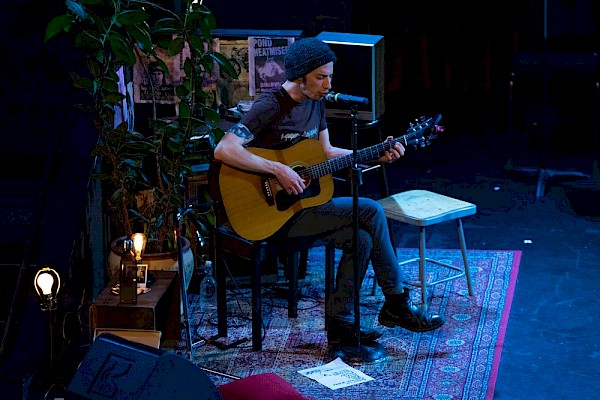 The Secret Sea playing in front of old Elliott Smith concert posters at the Alberta Rose Theatre in April 2018: Photo by Jacob WadeSince 1985, Third Angle has been stretching beyond the confines of traditional music performance, utilizing alternative spaces and multidimensional collaborations to create fully encompassing experiences for audiences and performers alike.
The Secret Sea playing in front of old Elliott Smith concert posters at the Alberta Rose Theatre in April 2018: Photo by Jacob WadeSince 1985, Third Angle has been stretching beyond the confines of traditional music performance, utilizing alternative spaces and multidimensional collaborations to create fully encompassing experiences for audiences and performers alike.
Artistic director Sarah Tiedemann lists just a few of these experiments, which include a 2016 performance of Steve Reich’s Different Trains at the Oregon Rail Heritage Center, the audience nestled in between two sets of rail cars; the 2019 West Coast premiere of John Luther Adams’ Everything That Rises at OMSI’s Kendall Planetarium; and the organization’s most recent series of works “about the landscapes and creatures most affected by climate change, communicating the urgency of the science through howls of Arctic wolves, data translated into pitches, and an homage to the Koch brothers.” Naturally, this series was “performed in the corporate headquarters of Vestas, a wind turbine company.”
As it continues in its fourth decade of existence, Third Angle isn’t pumping the brakes in the least. Tiedemann states that the current season will see Third Angle’s most ambitious project to date, a classical chamber opera collaboration with jazz pianist and composer Darrell Grant tackling one of Portland’s most visible issues: gentrification. Sanctuaries brings stories from one historically black neighborhood, Albina, to the forefront “with a libretto by two-time National Poetry Slam champion Anis Mojgani,” Tiedemann says. Directed by Alexander Gedeon, “This latest site-specific commission challenges Portland as a community to truly listen to and acknowledge marginalized voices while addressing issues of white privilege, racial equity and inclusion, and economic disparity.”
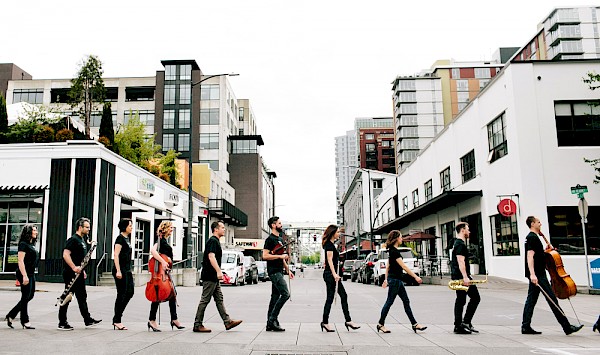 Third Angle's modular ensemble features talented locals performing and recording 21st-century music while collaborating with composers, dancers, poets, visual artists, authors and filmmakers: Photo by Ashley CourterThird Angle also formed a record label, 3A Records, in 2017 as an avenue to release some of its favorite programming for repeat consumption. A Fond Farewell, for example, is due out in November. The label is also releasing a diverse collection of works by South Asian-American composers featuring commissions, and executive director Lisa Volle says she is “pleased to have this avenue to share them with a wider audience. We’re also looking forward to spending the next couple of years digitally releasing a library of many of our past live recordings.”
Third Angle's modular ensemble features talented locals performing and recording 21st-century music while collaborating with composers, dancers, poets, visual artists, authors and filmmakers: Photo by Ashley CourterThird Angle also formed a record label, 3A Records, in 2017 as an avenue to release some of its favorite programming for repeat consumption. A Fond Farewell, for example, is due out in November. The label is also releasing a diverse collection of works by South Asian-American composers featuring commissions, and executive director Lisa Volle says she is “pleased to have this avenue to share them with a wider audience. We’re also looking forward to spending the next couple of years digitally releasing a library of many of our past live recordings.”
With Third Angle’s diverse, transmedial offerings and a modular ensemble, it’s no wonder that composers are submitting a high volume of works for consideration. Volle explains that it’s hard to nail down an exact number of submissions. “Some weeks we get none and some we get handfuls... but composers, performers and promoters are constantly sharing ideas with us about future programming and projects.” And with a concert season featuring only a handful of shows, competition is stiff. As its name implies, Third Angle New Music is always seeking to break ground in unexpected ways and move beyond conventional models of performance.

